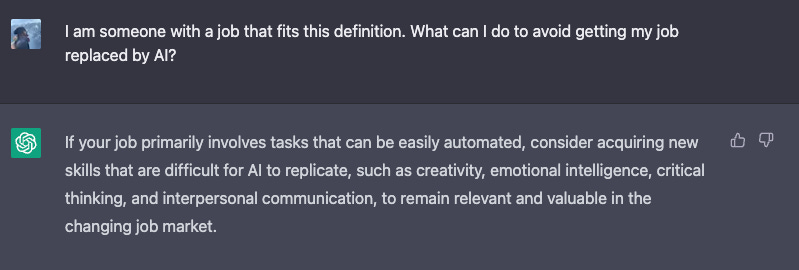Whoever you are, whatever you do, your life is about to change irreversibly in the next couple of years. I won’t beat around the bush. This is not a probabilistic prediction. This is a certainty.
Artificial general intelligence (AGI) is an AI system that can perform any intellectual task that a human can do. There are valid arguments that GPT-4 has sparks of AGI, although still incomplete and inconsistent. If rumor mills on Twitter are to be believed, OpenAI expects GPT-5 to achieve AGI. Regardless of the truth to these rumors, it probably means there’d be an open debate on whether AGI has been achieved — and in a world with an open debate on this, we’ll widely start seeing the impact of a near-AGI system in our lives.
What does it mean for you?
The rosy part is that you’ll have a kick-ass chatbot at your fingertips that’ll be capable of helping you with most questions and decisions. The not-so-rosy part is that if AGI can do your job almost as well or better than you, it eventually will.
You have a headstart. You have the next year or so to ensure you’re doing something which isn’t easily replaceable.
Now here’s where I start hypothesizing. If the core deliverable of your job isn’t creative problem-solving or decision-making, it's likely to be replaced by AI. These aren’t even my own words.
Will your job be replaced?
Creativity, emotional intelligence, critical thinking, and interpersonal communication. My interpretation of this answer is that you must fit either of the following two brackets to ensure that AGI is a tool for you and not an existential threat.
Your humanness is an asset.
You interact with humans directly in your job’s core deliverable. This in-person human interaction is difficult to replace and will likely stick around for the foreseeable future. Salespersons, healthcare workers, entertainers, etc.
You disambiguate through creativity.
You disambiguate if you face multiple choices as a part of your job, weigh pros and cons, often with incomplete information, and judiciously take a call based on your acquired knowledge, experience, and intuition. Entrepreneurs, engineers who design systems, product managers, etc.
What if you don’t fit these brackets?
Today is a good day to start working towards ensuring you fit these brackets. The best part is that, whatever you do, ambiguity is likely right around the corner. With a little effort and up-skilling, you’d soon be in a position where you’re the one navigating these ambiguities, making your function difficult to automate and hence, replace immediately.
For example, if you're a software engineer who primarily writes code based on system designs and requirements handed over to you, getting skilled at designing reliable, scalable, and maintainable software systems is probably where you should focus your time and energy.
I asked GPT to help articulate this point. In the attached table, Job 1 would likely be replaced quickly. Job 2 is what you should aim to upskill towards if your current job is similar to Job 1.
Conclusion
The parting thought I want to leave you with is — the best thing you can do right now is to upskill and stay informed. Leverage AI advancements. It’s a wonderful time to be alive. We’re witnessing something on the scale of the personal computer, the smartphone, and the internet — and my personal opinion is — something that, in hindsight, would dwarf all these other innovations.
As Paul Graham put it, ride this wave, don’t get swept by it.


